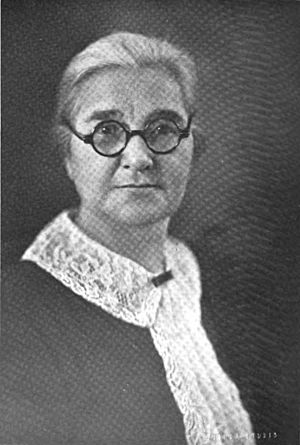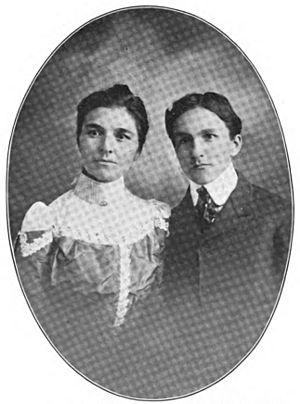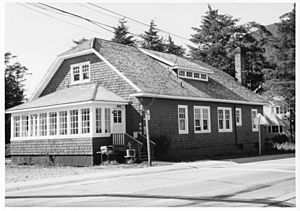Tillie Paul facts for kids
Matilda Kinnon "Tillie" Paul Tamaree (born January 18, 1863 – died August 20, 1952) was an important Tlingit leader. She worked as a translator, helped people gain their rights, was a dedicated educator, and became a respected elder in the Presbyterian church.
Contents
Early Life and Learning
Tillie Kinnon was born in Victoria, British Columbia. Her mother, Kut-Xoox, was Tlingit, and her father, James Kinnon, was Scottish. When her mother became sick, she arranged for Tillie and her sister to live with Tlingit relatives in the north. They traveled about 600 miles by canoe along the Inside Passage.
After her mother passed away, Tillie was raised by her aunt, Xoon-sel-ut, and her uncle, Chief Snook. They lived near Wrangell, Alaska. Her new family gave her the Tlingit name Katliyud, which was shortened to "Kah-tah-ah."
When Tillie was 12, she received a marriage proposal. She decided not to marry and instead went to live with missionaries in Port Simpson, British Columbia. There, she improved her English and learned more about Christianity. Later, she returned to Wrangell and attended the Presbyterian Home and School for Girls. This is where she began using the name "Tillie Kinnon."
Teaching and Church Work
While at the McFarland School, Tillie worked as an interpreter, helping people understand each other. In 1882, she married Louis Francis Paul. They became the first Native couple chosen by the Presbyterian Board of Home Missions to start a new missionary school.
Their first school was in Klukwan, Alaska, and it taught 64 men and women. Tillie and Louis also opened a second school in the Tongass area. Louis Paul died in 1886. Tillie was left to care for their three young sons.
She then moved to Sitka, Alaska, to work at the Sitka Industrial Training School. She did many jobs there, including interpreting, teaching sewing, and caring for students. She eventually became the head of the girls' dormitory.
In Sitka, Tillie worked with another teacher, Fanny Willard, to create a way to write the Tlingit language. They also put together a Tlingit dictionary. Tillie wrote articles about Tlingit culture for a newspaper and gave talks about it. She also learned to play the organ and her translated hymns are still used today.
Tillie traveled for the Presbyterian Church and spoke at important meetings. In 1931, she made history by becoming the first woman ordained as an elder in the Presbyterian Church in Alaska.
Fighting for Rights
In 1905, Tillie helped start the New Covenant Legion, a Christian group for Native communities. This group later grew into the Alaska Native Brotherhood (ANB) and Alaska Native Sisterhood. These were the first groups to stand up for the rights of Alaska Native people. Tillie's sons, William Paul and Louis Paul, became important leaders in the ANB. Many people recognized Tillie's influence in guiding these future leaders.
In 1922, Tillie helped her relative, Charlie Jones, vote after election officials in Wrangell tried to stop him. Both Tillie and Charlie were accused of breaking the law. Tillie's son, William, who was a lawyer, defended them in court in 1923.
The case was about whether Native people were citizens and could vote. Before 1915, a law called the Dawes Act said Native people had to give up their tribal ties to be citizens. In 1915, Alaska passed its own law that made it very hard for Native people to become citizens. William Paul argued that Charlie Jones met the requirements of the older Dawes Act because he owned a house, paid taxes, and lived like other citizens.
The judge agreed with William Paul. He ruled that the older Dawes Act meant Alaska could not add extra rules to stop Native people from voting if they met the earlier requirements. Tillie Paul Tamaree and Charlie Jones were found not guilty.
The judge's decision helped show that Native people born in the U.S. were citizens under the 14th Amendment. In 1924, the Indian Citizenship Act finally made all Native Americans born in the U.S. citizens. This gave them the right to vote, though some challenges still remained.
Family and Lasting Impact
Tillie Kinnon married Louis Francis Paul in 1882, and they had three sons. After Louis died in 1887, Tillie married William Tamaree in 1905, and they had three daughters.
In 1924, Tillie's son, William, became the first Alaska Native person elected to the state legislature. Tillie Paul passed away in 1952 at the age of 90.
Tillie Paul's legacy lives on. In 1979, a building at Sheldon Jackson College was named after her. In 1997, her daughter-in-law wrote a children's book called Kahtahah, based on Tillie's early life. In 2001, the Sheldon Jackson School became a National Historic Landmark.
In 2015, Tillie Paul's great-granddaughter, Debra O'Gara, became a judge for the Tlingit and Haida Indian Tribes of Alaska. In 2020, Tillie's work for civil rights was featured in an exhibit at the Alaska State Museum called "Alaska's Suffrage Stars."
 | Emma Amos |
 | Edward Mitchell Bannister |
 | Larry D. Alexander |
 | Ernie Barnes |




